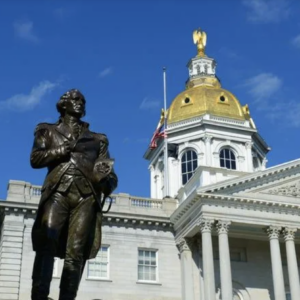The latest NHJournal/Preacones Analytica poll of Granite State voters reveals an electorate that’s willing to consider candidates from both parties, depending on the office being contested. And it also offers an insight as to why New Hampshire Democrats, who’ve had so much success at the federal level, struggle to win in Concord.
They’re out of step with independent voters on the issues.
It doesn’t take a poll to prove that New Hampshire voters prefer Democrats over Republicans in federal elections. Since the 2010 red wave, the GOP has won just one federal race — Rep. Frank Guinta taking back the First Congressional District in 2014. (He lost it again in 2016).
Since George W. Bush carried the state in 1988, Republicans have lost every presidential race except the 2000 contest.
Asked in the new NHJournal poll if they would prefer a Republican or Democratic candidate for Congress — the “generic ballot” question — Granite Staters preferred a Democrat, 40.6 to 35.7 percent. Among undeclared voters, the margin was slightly bigger: 30.9 to 24.7 percent.
But ask those same voters who they would “rather have running New Hampshire state government – the governor and State House – after the next election?” and the Democrats’ margin is much smaller: 42 to 39.7 percent. And undeclared voters actually prefer the GOP, 33.5 to 31.8 percent.
 Republican Gov. Chris Sununu has won four elections in a row, and the GOP has won control of the state legislature in three of the past four elections — though their 2022 majority was a slim 201-198 (with one vacancy).
Republican Gov. Chris Sununu has won four elections in a row, and the GOP has won control of the state legislature in three of the past four elections — though their 2022 majority was a slim 201-198 (with one vacancy).
In 2020, New Hampshire was the only state in the country where the GOP flipped both houses of the legislature from blue to red.
And while other New England states like Vermont and Massachusetts have elected Republican governors, they have been solidly liberal candidates like Charlie Baker (Mass.) and Phil Scott (Vt.).
Sununu, on the other hand, is a center-right Republican who signed laws banning late-term abortion and creating Education Freedom Accounts.
How do New Hampshire Republicans win state elections while getting swamped in U.S. House and Senate races?
NHJournal asked Granite State voters to pick the issue most important to them when they consider giving a candidate their vote. On a majority of the issues, independent voters were closer to the GOP than the Democrats.

The top issue by far for undeclared voters was housing (28.3 percent), something that also concerns both Democrats and Republicans. But the second priority of independent voters was preventing a state sales or income tax (21.8 percent), which is also a priority for Republicans (20.9 percent), but not Democrats (8.8 percent).
Both Republicans (28.8 percent) and undeclared voters (16.6 percent) say stopping illegal immigration is important, but only 5.6 percent of Democrats agree.
And while Democrats rank “fighting climate change” just as important as “lowering property taxes” (both are at 17 percent), only 3.3 percent of independent voters said climate is their top concern.
Abortion is the outlier, with 29.3 percent of Democrats calling it their top issue, and a sizeable 17.6 percent of undeclared voters did the same. But the overall gap between undeclared voters’ priorities and Democrats was nearly twice as large (58.8 percent) as with the GOP (29.5 percent).
Democrats are also out of step on other hotly-contested issues as well. Last week, Granite State Democrats denounced Sununu for signing a law protecting girls’ sports from biological males who identify as female.
State Senate Democratic Leader Donna Soucy called it “extreme” and part of the “culture war.”
However, a May 2024 poll found Granite Staters agree with Sununu 59 to 18 percent, a three-to-one margin.
And Democrats can continue to insist that Republicans are overhyping the immigration issue, but a March 2024 UNH Survey Center poll found 58 percent of respondents said illegal immigration is a “very serious” problem, and another 35 percent said it was “somewhat serious.” That compares to “not too serious” (12 percent) and “not a serious problem at all” (4 percent).
Among self-declared independent voters, 88 percent say it’s a serious problem, and even 67 percent of Democrats agreed.
Obviously candidate quality and campaign resources (AKA “money”) matter, but the data are clear: If New Hampshire Republicans can get the candidates and cash to compete, they’ll hold the advantage of having the issues on their side.





